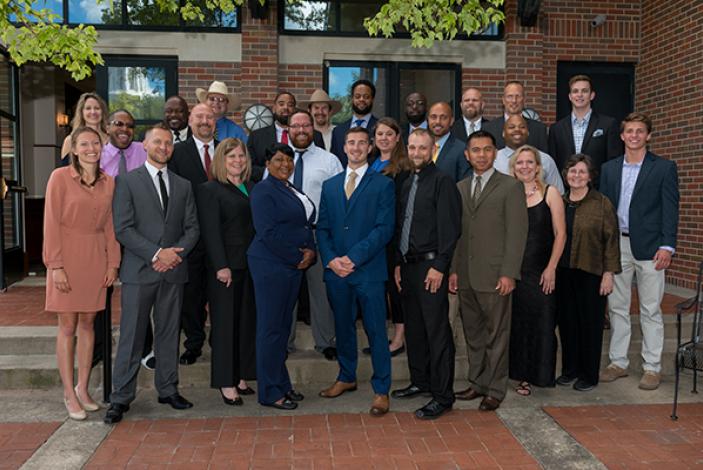
Veterans make big plans after second annual Entrepreneurship Bootcamp for Veterans

Most veterans don’t imagine they will ever sign up for to boot camp again, but 19 former service men and women chose to participate in a boot camp of a different sort at the MU Trulaske College of Business. The Entrepreneurship Bootcamp for Veterans, held in June, gave participants new skills and insight into starting new business ventures, which many envision will not only serve themselves, but others, too.
Such is the case for Misty Sow, a U.S. Air Force veteran whose mission is to develop the Rose Warriors Project. The goal of Rose Warriors is to provide holistic approaches to treatment and therapy for post-traumatic stress disorder and military sexual trauma. Sow says in addition to developing her idea as a business, she would like for this model to become the industry standard for that type of care.
“A holistic treatment approach is missing in this demographic, especially for women veterans.” She explains that the goal is to consider the overall, or holistic, life experience of female veterans, not just focusing on MST or PTSD.
The implications are widespread. “This could benefit society as a whole,” Sow says. “The results of this type of treatment will affect every body patients connect with.”
Mizzou hosted its second EBV at the college with attendees coming from across the country and from multiple branches of the U.S. military. The program originated in 2007 at Syracuse University, which oversees the EBV national program, and aims to provide post-Sept. 11 veterans with the resources and experiential learning in higher education so they can advance an idea into an actual business.
“The world we live and work in is constantly involving and changing. This is why I am such a strong proponent of entrepreneurship and fostering an environment that encourages discovery and learning. The Entrepreneurship Bootcamp for Veterans with Disabilities has much to offer in this regard, and by being selected to take part in this boot camp, veterans can put their skills to use and contribute to society in a way that is meaningful to them,” said Trulaske College of Business Dean Ajay Vinzé.
The agenda for the week included networking events, as well as in-depth sessions taught by faculty members and business professionals. From ideas and pitching, to legal issues, to finance, marketing, and management, the material covered comprised the full spectrum of the most fundamental aspects of businesses and entrepreneurship. The overall goal is to provide a roadmap, guidance, and the concept of a business model canvas that can be used in entrepreneurial endeavors.
“The EBV program has the ability to change lives,” said Gregory Bier, director of MU’s EBV program. “The program provides veterans with skills necessary to go back home and become part of the economic engine in their communities by being engaged small business owners. EBV teaches veterans to build on their military skills and provides the spark necessary for the participants to pursue their entrepreneurial goals for themselves and their families.”
One of the main themes of the week was how military training cultivates the same personality traits that needed are to be a successful entrepreneur. Tenacity, self-reliance, problem solving and organizational skills, self-confidence, passion, and critical thinking are often are hallmarks of people who have served in the military. EBV reminds and encourages veterans to rely on the experience, leadership and decision making skills they already have.
“The life experiences veterans have make them especially well-suited for entrepreneurship. The need for self-confidence, leadership skills, determination and problem solving are important no matter what specific role they had in the military, but these are also traits that are integral to being a successful entrepreneur,” Vinzé said.
Karia Coleman Jr. is a good example of how one experience influences another. A U.S. Army veteran and now a certified personal trainer, Coleman is using his experience to develop a new personal training business model.
“Large fitness corporations often put a huge amount of stress on employees to sell and meet quotas or get fired,” Coleman said. “There is very little concern for the clients.”
But with Coleman’s background, he knows there is another option. “Through PT Test, the Army makes exercise very competitive, but as a team, we grew strong and fit together,” so now he’s on a mission to provide client-centered fitness, and the EBV helped to provide support in his goal.
For the participants, there is the tactical element of learning new business skills, but the EBV also focuses in large part on reminding participants to be confident in their capabilities and to make sure they are networking and sharing their business and ideas within their own communities.
“The biggest impression that I have taken away from the EBV program would be the power of networking with those who have already found success as entrepreneurs, having the knowledge of where to find resources, and the motivation and inspiration of just reconnecting with other veterans, specifically, those veterans who are in pursuit of similar goals, such as owning a business.” said Daniel Trtanj, a U.S. Marine Corps veteran.